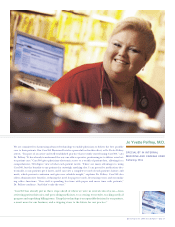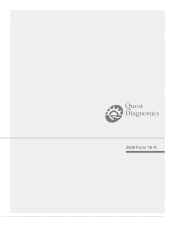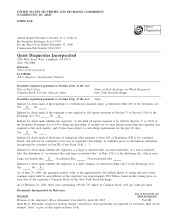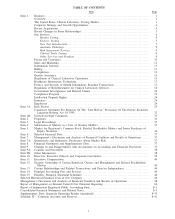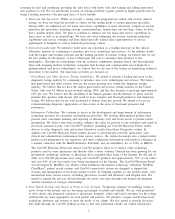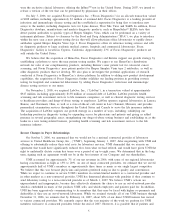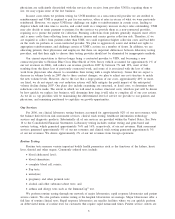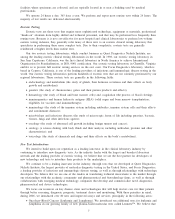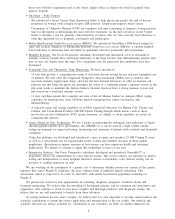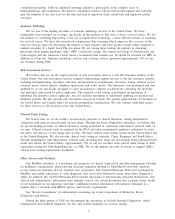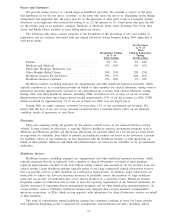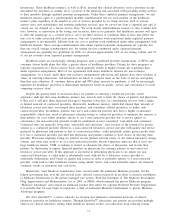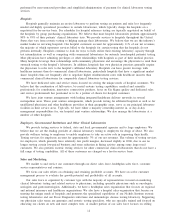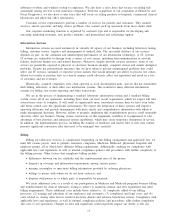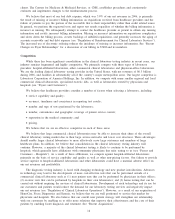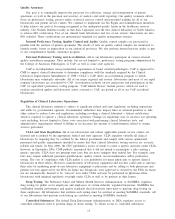Quest Diagnostics 2006 Annual Report Download - page 26
Download and view the complete annual report
Please find page 26 of the 2006 Quest Diagnostics annual report below. You can navigate through the pages in the report by either clicking on the pages listed below, or by using the keyword search tool below to find specific information within the annual report.were the exclusive clinical laboratory offering the InSureTM test in the United States. During 2007, we intend to
release a version of the test that can be performed by physicians in their offices.
On July 3, 2006, we acquired Focus Diagnostics Inc. (“Focus Diagnostics”) in an all-cash transaction valued
at $208 million, including approximately $3 million of assumed debt. Focus Diagnostics is a leading provider of
infectious and immunologic disease testing and has established a reputation for being first to introduce new
assays to the market, including diagnostic tests for Lyme disease, West Nile Virus and SARS. In addition, Focus
Diagnostics develops, manufactures and markets diagnostic products, such as HerpeSelect威ELISA tests that
detect patient antibodies to specific types of Herpes Simplex Virus, which can be performed on a variety of
instrument platforms. Subject to clearance by the Food and Drug Administration (“FDA”), we plan to introduce
within the next year a near patient testing device that will allow physician office laboratories to rapidly detect
antibodies against Herpes Simplex Virus type 2. Focus Diagnostics offers its reference testing services and sells
its diagnostic products to large academic medical centers, hospitals and commercial laboratories. Focus
Diagnostics’ facility is located in Cypress, California. Approximately 27% of Focus Diagnostics’ products are
sold outside the United States.
We believe that the acquisition of HemoCue, Focus Diagnostics and Enterix support our growth strategy by
establishing a platform to serve the near patient testing market. We expect to use HemoCue’s distribution
network for sales of our complementary products, including Enterix’s near patient test for colorectal cancer
screening, and Focus Diagnostics’ near patient product for Herpes Simplex Virus type 2 antibodies, as well as
other diagnostic products that we develop. We also plan to investigate the potential applications of research
conducted at Focus Diagnostics to HemoCue’s device platform. In addition to adding new product development
capabilities, the acquisition of Focus Diagnostics further solidifies our leading position in providing esoteric
testing for hospitals and commercial laboratories by adding Focus Diagnostics’ infectious and immunologic
disease testing services to our menu.
On November 1, 2005, we acquired LabOne, Inc., (“LabOne”), in a transaction valued at approximately
$947 million, including approximately $138 million of assumed debt of LabOne. LabOne provides health
screening and risk assessment services to life insurance companies, as well as clinical diagnostic testing services
to healthcare providers and drugs-of-abuse testing to employers. LabOne operates regional laboratories in Lenexa,
Kansas, and Cincinnati, Ohio, as well as a state-of-the-art call center in Lee’s Summit, Missouri, and provides
paramedical examination services throughout the United States and Canada to serve the life insurance industry.
The acquisition of LabOne supports our growth strategy in a number of ways, including: solidifying our
leadership position in diagnostic testing by expanding access for physicians and patients and giving us added
presence in several geographic areas; strengthening our drugs-of-abuse testing business and establishing us as the
leader in a new testing-related business, providing health screening and risk assessment services to the life
insurance industry.
Recent Changes in Payer Relationships
On October 3, 2006, we announced that we would not be a national contracted provider of laboratory
services to United Healthcare Group, Inc., (“UNH”), beginning January 1, 2007. After negotiating with UNH and
offering to substantially reduce their total costs for laboratory services, UNH demanded that we execute an
agreement that would have significantly reduced fees from what we had offered, and would have given UNH the
right to unilaterally dictate certain key terms over a period of up to eight years. We determined that in the long
term, signing such an agreement would not be in the best interest of our Company and our shareholders.
UNH accounted for approximately 7% of our net revenues in 2006, with some of our regional laboratories
having concentrations as high as 15% to 20%. As one of many contracted providers, we estimate that we served
approximately half of UNH’s members or approximately three times as many as our single largest competitor.
We believe that this was because physicians and patients preferred using us due to quality and convenience.
While we expect to continue to service UNH’s members in certain limited markets as a contracted provider and
in other markets as a non-contracted provider, UNH has threatened physicians with penalties if they continue to
send laboratory testing to a non-contracted provider as of March 1, 2007. We believe UNH’s actions are
unprecedented and inappropriate, because they effectively eliminate the choice to use an out-of-network provider
which is embedded in many of the products UNH sells, and which employers and patients paid for. In addition,
UNH has been aggressively communicating to its members that they may be faced with higher co-payments and
deductibles if they use an out-of-network laboratory. While we retained virtually all of our UNH business through
December 31, 2006, we estimate that by February 16, 2007, about 60% of our direct UNH business has moved
to various contracted providers. We currently expect that the vast majority of the work we perform for UNH
members will move to contracted providers before the end of 2007. However, it is possible that if patients and
5



